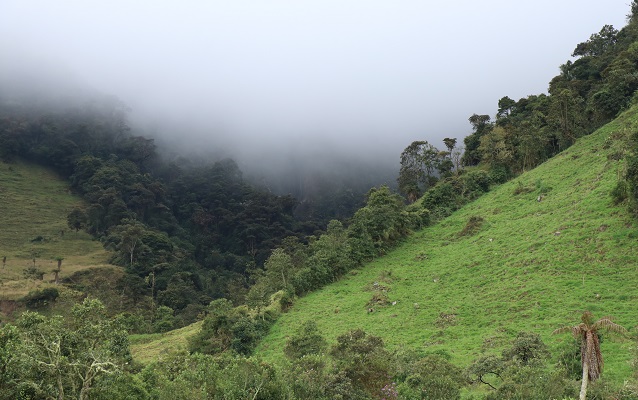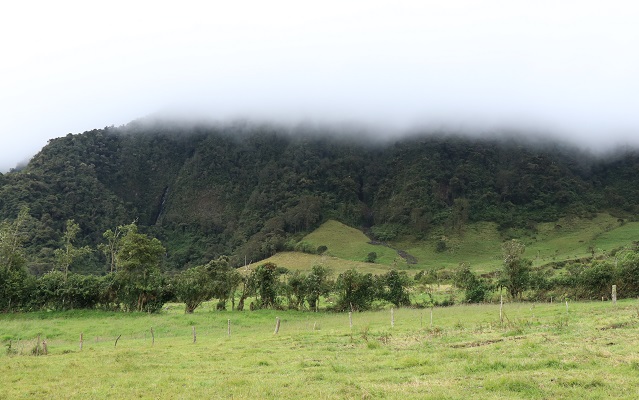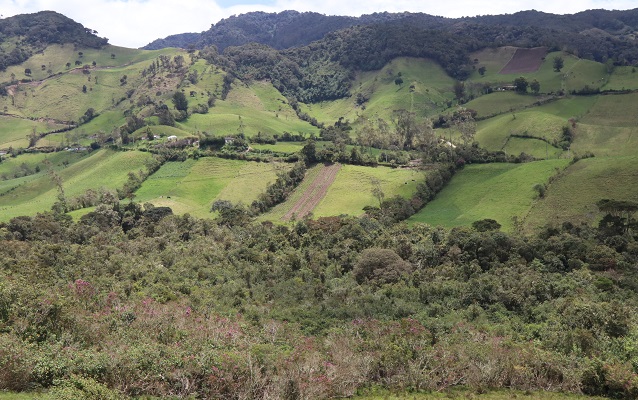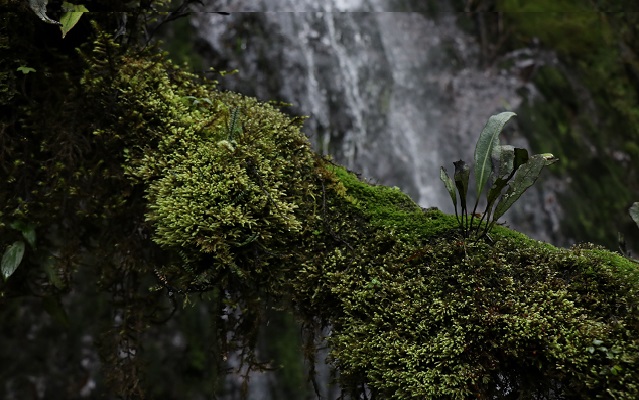Sustainable land use management and farmer field schools for forest protection

One of the last forests in the eastern mountain range of the Andes is in the province of Carchi in northern Ecuador. Its ecosystem is severely endangered by various interests of use, such as the conversion of natural forests into arable and pastureland. The Carchi Decentralized Autonomous Protected Area (Área Protegida Autónoma Descentralizada Cordillera Oriental del Carchi) was created in 2015 to protect, conserve, and restore threatened ecosystems. This IKI Small Grants project seeks to support the management of the protected area. Through strengthening the capacity of the local population, it increases environmentally friendly activities in the area. It aims to develop plans that protect the natural resources, integrating local interests. It further produces and disseminates scientific knowledge on local biodiversity. The project works with provincial and local governments and is based on a participatory multi-stakeholder approach to be able to use the same methods in other regions.
INITIAL SITUATION
Since the 1970s, the fragmentation of high Andean ecosystems through human intervention and the loss of its biodiversity is evident. Since then, wood extraction in native forests and conversion of natural forests to arable and pasture land became a normality. Eucalyptus forests in sensitive water catchments, which are considered water recharge areas for human consumption and irrigation systems, are largely destroyed. These changes fragmented the high Andean ecosystems and decreased their functionality. The Carchi Decentralized Autonomous Protected Area APAD COC was created in 2015 to protect, conserve, and restore these fragile and threatened ecosystems. It primarily focuses on those of ecological sensitivity associated with water resources in the eastern mountain range. It covers an area of around 20,000 hectares of natural ecosystems and agricultural mosaics.
TARGET GROUP
The ADAP COC includes parts of four municipalities: Bolívar, Julio Andrade, Tulcán, and San Pedro de Huaca. At a lower political administrative level, it includes areas of eleven communities with a total of 55.000 inhabitants, who are the indirect beneficiaries of the project. The direct beneficiaries are the local Water Administration Boards (WABs). Around 17 WABs in the area with approximately 150 beneficiaries in each WAB are targeted. These beneficiaries are landowners in the ADAP COC area who conduct agricultural activities.
APPROACH AND ACTIVITIES
This IKI Small Grants project supports the conservation of the ADAP COC protected area. It identifies and analyses places with the greatest risks for conservation. In these places, private landowners are advised to include sustainable planning processes on their farms. This planning process is carried out jointly with the local farm owners and public institutions like the Provincial Government of Carchi and the national Ministry of the Environment. The latter helps to facilitate the contact with local WABs.
Furthermore, the project establishes farmer field schools or ECAs (Escuelas de Campo Agrícolas). Agricultural activities are steered towards a sustainable and ecological vision that allows for conservation of the remaining ecosystems while protecting water sources. Participants will receive training and mentoring based on a participatory curriculum. This ECA model promotes sharing experiences and knowledge.
During the farmer field schools, the main drivers of deforestation or land use change in the area are discussed. As one of the common risks in the area are wildfires, the project develops and establishes protocols to prevent wildfires and trains farmers and landowners.
As a third conservation pillar, the project establishes reforestation, and afforestation areas, and promotes climate -smart agricultural techniques. Traditional knowledge and agroecology are main parts in trainings and farmer field school curriculums.
LATEST PROJECT HIGHLIGHTS AND IMPACTS
- Planning of field school sessions, based on the result of a participatory diagnosis of problems and needs of the landowners. Four themes were selected for the field schools: fruit, pastures, wildlife-human conflict management and fire brigade.
- In December sessions with landowners and local governments were held to create a framework and to define field school involvement. Specifically, one workshop with landowners and one workshop with local government representatives took place.
- Field school sessions on agroecology, biofertilizers, soil protection, and more began in January, rotating among participants’ properties. Through the “learn and doing” methodology, 8 sessions for the fruit field school and 5 sessions for the pasture field school have been held. In addition, a 2-day knowledge tour on permaculture, agroecology and bioentrepreneurship with 35 participants and a session on managing wildlife-human conflict also took place.
- Professionals addressed participant questions with a focus on agroecology, bio-inputs, good practices, reforestation, and water protection.
CAPACITY DEVELOPMENT
IKI Small Grants supports CGRR in their organisational capacity development through:
- Enhanced fund-raising capacity by effective project development and efficient response to institutional consultancy opportunities
- Expanding internal leadership and management capacity especially among younger members
- Developing an external advisory council of experts to guide CGRR to new development and conservation opportunities
- Ability to operate efficiently in a mostly virtual mode including archival capacity for internal documentation and publication
ABOUT THE ORGANISATION
Corporacion Grupo Randi Randi (CGRR) is a private, non-profit Ecuadorian corporation, domiciled in the city of Quito, Province of Pichincha. CGRR was created in 2000, according to a ministerial agreement of the Ministry of Agriculture, Livestock, Aquaculture and Fisheries. The CGRR works for the conservation of natural resources, sustainable development, and social and gender equity. It promotes research and technical assistance in communities and local organisations located in threatened ecosystems. The group adopted the expression randi randi – ‘giving and giving’ in the Kichwa language, because it expresses the sense of reciprocity that fuels CGRR’s work: they offer knowledge, support, and experience, which will be received and returned in one way or another.



